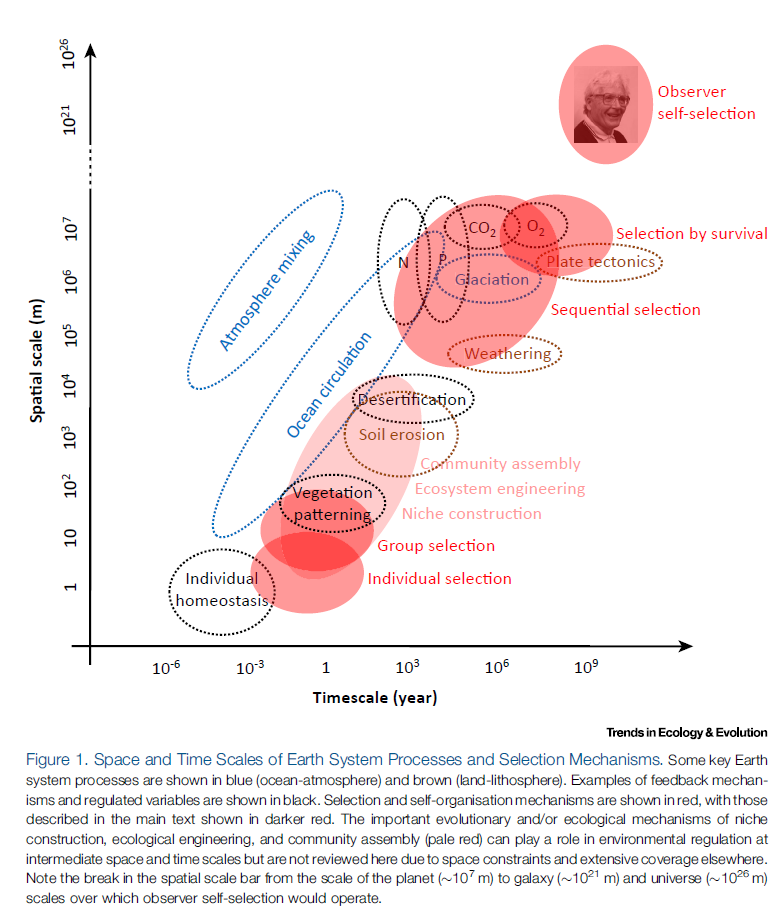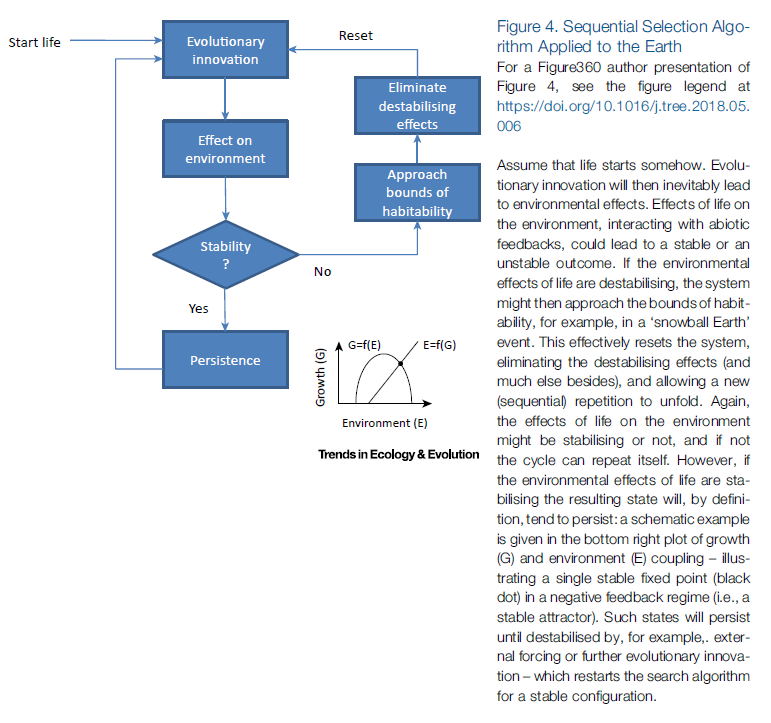Reproduction
This note is about reproduction in living and other far-from-equilibrium systems.
Not all agents are self-reproducing, but all agents are products of self-reproducing agents.
Sharov, Alexei A. ‘Mind, Agency, and Biosemiotics’. Journal of Cognitive Science 19, no. 2 (2018): 195–228. https://doi.org/10/gssxcv.
Reproduction of genetic, phenotypic, cultural, and other patterns in living systems can be influenced by various factors, such as environmental conditions, genetic variation, natural selection, genetic drift, gene flow, mutation, recombination, epigenetics, social interactions, and cultural transmission.
Reproduction of Individuals
But see the complications on biological individuals.
Reproduction is the process by which living systems produce new individuals that are similar to themselves, but also different in some ways. Reproduction plays a vital role in maintaining the continuity, diversity, and evolution of life on Earth.
- sexual
- asexual
Cultural Reproduction
Cultural reproduction in nonhuman societies is the process by which animals and plants transmit their cultural traits, such as behaviours, skills, knowledge, and preferences, from one generation to the next. Can occur through various mechanisms, such as social learning, imitation, teaching, communication, and gene-culture coevolution. Can affect the survival, adaptation, and evolution of different species and populations.
- The transmission of song dialects in birds, such as canaries, sparrows, and parrots. Birds learn their songs from their parents or other conspecifics, and can modify or invent new songs over time. Bird songs can serve various functions, such as attracting mates, defending territories, or signalling identity.
- The transmission of tool use in primates, such as chimpanzees, gorillas, and orangutans. Primates learn how to use tools from their mothers or other group members, and can use tools for various purposes, such as cracking nuts, fishing for termites, or extracting honey. Tool use can enhance the foraging efficiency and ecological niche of primates.
- The transmission of migration routes in mammals, such as whales, elephants, and caribou. Mammals learn their migration routes from their elders or leaders, and can adjust their routes according to environmental changes or social factors. Migration routes can help mammals find food, water, shelter, or mates.
Catchpole, Clive, and P. J. B. Slater. Bird Song: Biological Themes and Variations. 2nd ed. 1996. Reprint, Cambridge: Cambridge University Press, 2008.
Autopoietic and Other Self-Maintaining Systems
It is an open questions what persists.
Szerszynski, Bronislaw. ‘Infrastructuring as a Planetary Phenomenon: Timescale Separation and Causal Closure in More-Than-Human Systems’. Historical Social Research / Historische Sozialforschung 47, no. 4 (2022): 193–214.
Lenton, Timothy M., Timothy A. Kohler, Pablo A. Marquet, Richard A. Boyle, Michel Crucifix, David M. Wilkinson, and Marten Scheffer. ‘Survival of the Systems’. Trends in Ecology & Evolution 36, no. 4 (2021): 333–44. https://doi.org/10/gjsfd5.
Zaharescu, Dragos G., Carmen I. Burghelea, Katerina Dontsova, Christopher T. Reinhard, Jon Chorover, and Rebecca Lybrand. Biogeochemical Cycles. American Geophysical Union (AGU), 2020.
Stencel, Adrian, and Dominika Wloch-Salamon. ‘A Pluralistic View of Holobionts in the Context of Process Ontology’. Frontiers in Microbiology 13 (2022): 911577. https://doi.org/10/gstcxd.
Egbert, Matthew, Martin M. Hanczyc, Inman Harvey, Nathaniel Virgo, Emily C. Parke, Tom Froese, Hiroki Sayama, Alexandra S. Penn, and Stuart Bartlett. ‘Behaviour and the Origin of Organisms’. Origins of Life and Evolution of Biospheres 53, no. 1 (2023): 87–112. https://doi.org/10/gstcxg.
Veigl, Sophie J., Javier Suárez, and Adrian Stencel. ‘Rethinking Hereditary Relations: The Reconstitutor as the Evolutionary Unit of Heredity’. Synthese 200, no. 5 (2022): 367. https://doi.org/10/gstc3m.
Ibanez, Sébastien. ‘The Evolution of Ecosystem Phenotypes’. Biological Theory 15, no. 2 (2020): 91–106. https://doi.org/10/gqvm3m.
Gaia
The idea that the whole-planet system regulates, maintains, and reproduces itself.
!
Gaian discussions.


Lenton, Timothy M., Stuart J. Daines, James G. Dyke, Arwen E. Nicholson, David M. Wilkinson, and Hywel T. P. Williams. ‘Selection for Gaia Across Multiple Scales’. Trends in Ecology & Evolution 33, no. 8 (2018): 633–45. https://doi.org/10/gd3qcm.
References
Callicott, J. Baird. Thinking Like a Planet: The Land Ethic and the Earth Ethic. New York: Oxford University Press, 2013.
Clarke, Bruce. Gaian Systems: Lynn Margulis, Neocybernetics, and the End of the Anthropocene. Minneapolis: University of Minnesota Press, 2020.
Clarke, Bruce. ‘Rethinking Gaia: Stengers, Latour, Margulis’. Theory, Culture & Society 34, no. 4 (1 July 2017): 3–26. https://doi.org/10/gf37jv.
Doolittle, W. Ford. ‘Making Evolutionary Sense of Gaia’. Trends in Ecology & Evolution 34, no. 10 (2019): 889–94. https://doi.org/10/gf8xdh.
Frank, Adam, David Grinspoon, and Sara Walker. ‘Intelligence as a Planetary Scale Process’. International Journal of Astrobiology 21, no. 2 (2022): 47–61. https://doi.org/10/gphj4k.
Harding, Stephan. Animate Earth: Science, Intuition and Gaia. 2nd ed. 2006. Reprint, Cambridge: Green Books, 2013.
Latour, Bruno, and Catherine Porter. Facing Gaia: Eight Lectures on the New Climatic Regime. Cambridge: Polity, 2017.
Lenton, Timothy M., and Bruno Latour. ‘Gaia 2.0’. Science 361, no. 6407 (2018): 1066–68. https://doi.org/10/gfgnf9.
Margulis, Lynn, and Dorion Sagan. Slanted Truths: Essays on Gaia, Symbiosis and Evolution. New York: Springer, 1997.
Margulis, Lynn. Symbiotic Planet: A New Look at Evolution. New York: Basic Books, 1998.
Pak, Chris. Terraforming: Ecopolitical Transformations and Environmentalism in Science Fiction. Liverpool: Liverpool University Press, 2016.
Ruse, Michael. The Gaia Hypothesis: Science on a Pagan Planet. Chicago: The University of Chicago Press, 2013.
Schneider, Stephen Henry, ed. Scientists Debate Gaia: The Next Century. Cambridge, MA: MIT Press, 2004.
Tyrrell, Toby. On Gaia: A Critical Investigation of the Relationship between Life and Earth. Princeton: Princeton University Press, 2013.
Relevance
Reproduction is presumed in the notion of 'future generations' and the ethical obligations towards them.
Mulgan, Tim. Future People: A Moderate Consequentialist Account of Our Obligations to Future Generations. Oxford: Oxford University Press, 2006.
References
Nuño de la Rosa, Laura. ‘Agency in Reproduction’. Evolution & Development, 2023. https://doi.org/10/gsmzwj.